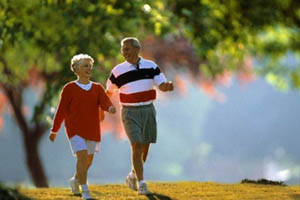 Staying active as an older adult may keep both the body and the brain in shape.
Staying active as an older adult may keep both the body and the brain in shape.
A new study suggests moderate aerobic exercise may slow or even reverse age-related memory loss in older adults by increasing the size of the hippocampus, a part of the brain that assists in forming memories.
The volume of the hippocampus may shrink and lead to memory impairment in the elderly. But researchers found one year of moderate aerobic exercise, like walking, in a group of older adults increased the volume of hippocampus by 2%, which effectively reversed the age-associated shrinkage by one to two years.
Researchers say it’s the first study of its kind to look at the effects of exercise on age-related brain changes associated with memory loss in the elderly.
In the study, published in the Proceedings of the National Academy of Sciences, researchers randomly assigned 120 sedentary adults between the ages of 55 and 80 into one of two groups.
One group began an aerobic exercise program of walking around a track for 40 minutes a day, three days a week; a comparison group limited exercise to stretching and toning exercise.
Brain scans taken at the start of the study and again one year later showed that the right and left sides of the hippocampus increased by 2.12% and 1.97%, respectively, in the aerobic exercise group.
In contrast, these regions decreased in volume in the comparison group by 1.40% and 1.43%, respectively.Tests of spatial memory function also showed improvements in the aerobic exercise group associated with this increase in hippocampus volume.Researchers say they also found increases in several markers associated with brain health, such as brain-derived neurotropic factor (BDNF) that corresponded with the increase in hippocampus volume.
Add The Sports Daily to your Google News Feed!